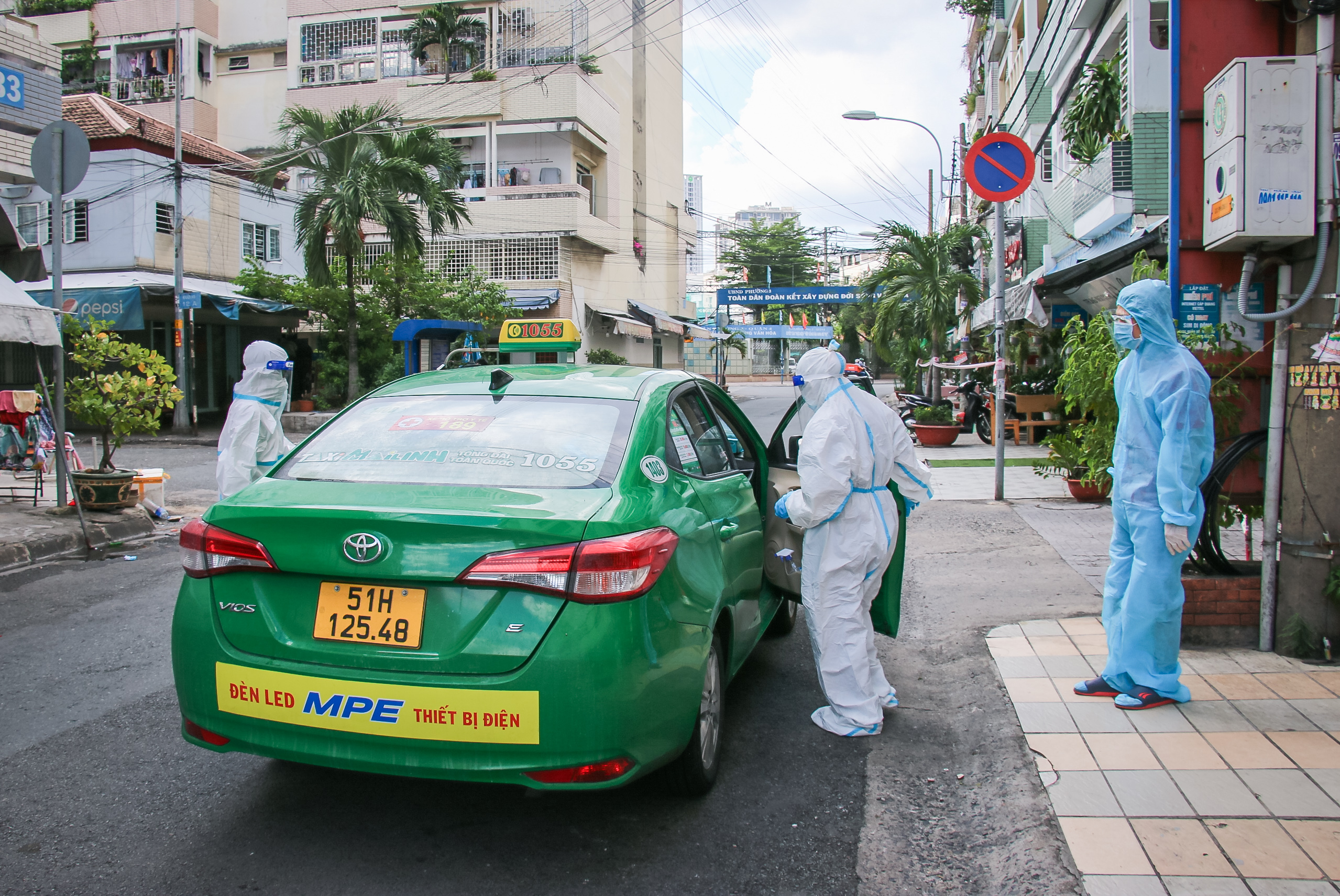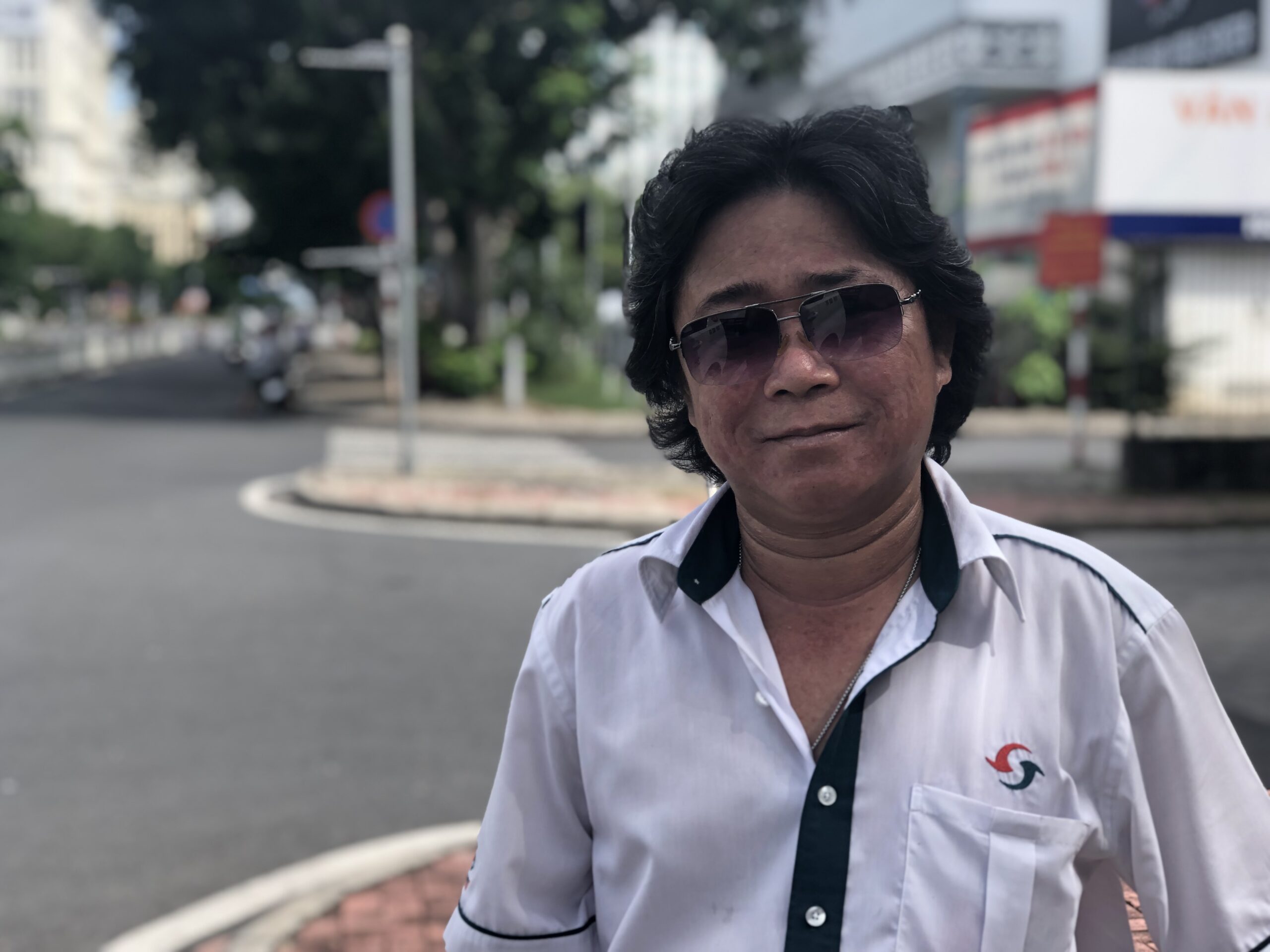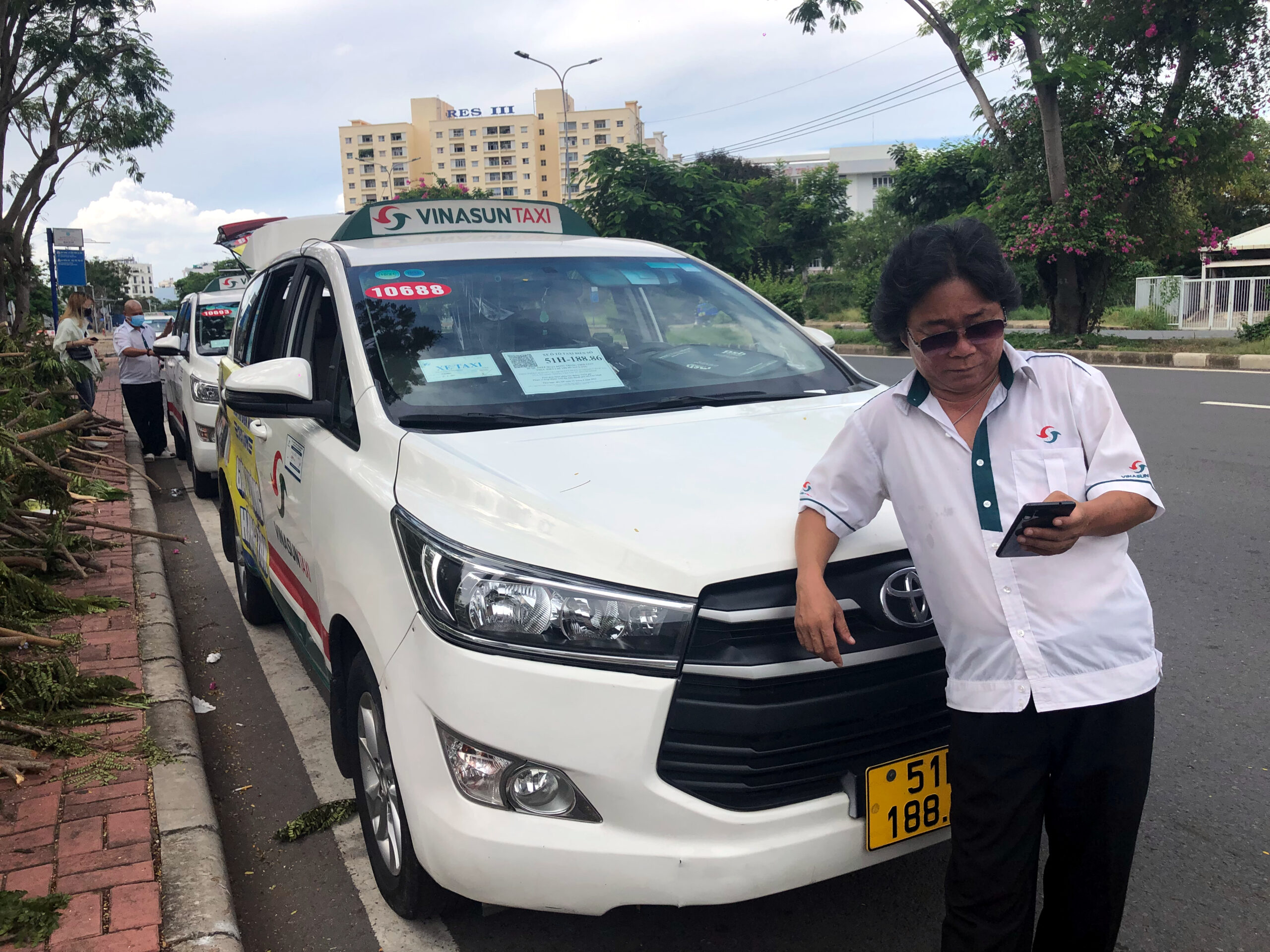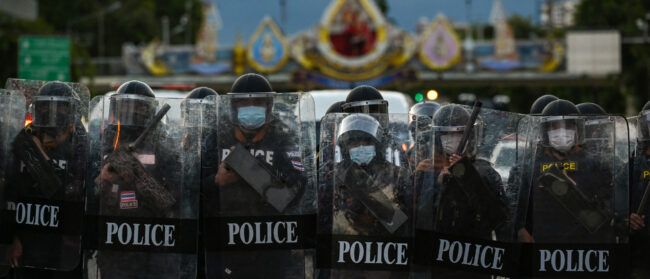Through the windows of a taxi cab making its way through deserted Ho Chi Minh City, the once-bustling Vietnamese metropolis is almost unrecognisable as empty street after empty street rolls by.
Passing a sidestreet where customers once sat on low plastic stools eating bowls of pho, one now sees strings of red tape, hung to mark an alley where positive Covid-19 cases have been found. Rounding a corner onto To Hien Thanh street in the city’s District 10, it now serves as a checkpoint where policemen ensure everyone has a valid reason to be outside.
Storefronts are shuttered, sidewalks are quiet and the few people out on the street are frontline workers dressed head-to-toe in bright blue hazmat suits or soldiers in uniform sent to keep the peace during the city’s Covid-19 outbreak and the darkest period it has faced in decades.
This picture of a city under lockdown can be seen only by groups with permission to be outside. During a time in which residents have been instructed to shelter in place to contain the virus, some people still need to move – those on essential trips to places like the hospital, vaccination appointments and the airport. With ride hailing apps suspended, the city’s traditional taxi cab drivers are the ones that have been handed the responsibility to transport them.
“I am very worried for my health and my family’s health,” said Huỳnh Ngọc Chiêu, a 43-year-old driver. He pulls a certificate of a recent negative Covid test out of the glove compartment of his bright-orange Mitsubishi seven-seater. “So every week I go to check my health.”
Vietnam’s traditional taxi drivers in recent years have faced brutal competition from ride-hailing apps like Grab and more recently a loss of customers due to the Covid-19 pandemic, which has cut off international tourists from the country. Now, as Ho Chi Minh City faces an ever-worsening outbreak of the virus, government measures suspending ride-hailing apps and all forms of public transport have left authorised traditional taxis as the only lifeline for residents who have no other means of transportation.
While the absence of competition from ride-hailing apps has opened up new opportunities for traditional taxi firms who now have a monopoly on transportation in the city, it is bittersweet, as drivers who once made their living taking tourists between hotels and the airport are now risking their lives as frontline workers during the pandemic.
Despite the risks, many drivers feel a sense of duty to continue working.
“Actually, we know this time is risky, but we have no choice because there are a lot of people in need,” said Tuấn Anh, who runs the car company Clown Vietnam. One of his drivers became sick with Covid-19 after a family member came into contact with a positive case, but he has since recovered.
“We all follow 5K rules [of Covid prevention] and the drivers do know how to protect their health and safety for them and customers. They don’t talk with customers in the car and always wear masks and use sanitiser.”

While usually the more popular choice for public transportation in the city, Grab and other ride-hailing apps have been suspended since June 20 by the government in an effort to contain Covid-19, only allowing cars and taxis with special licenses from the Department of Transportation to continue operating. This ensures that those vehicles still on the road meet government requirements, including that drivers must follow health guidelines, wear masks, use hand sanitiser, and have their passengers fill out health declarations and prove that they have legitimate reasons to be travelling.
While ride-hailing apps like Grab work use gig workers, taxi companies officially employ their drivers and own their fleet of vehicles and can better ensure that drivers are professionally trained and vehicles are outfitted with proper safety measures, according to a spokeswoman for Mai Linh Group, Vietnam’s largest taxi company.
When Grab was first suspended, Clown Vietnam’s Anh said he noticed a sharp increase in his firm’s bookings to about 30-35 trips per day.
“This was definitely overwhelming for us a bit because before Grab was suspended, we had done about 10 trips a day,” he said.
I think I am very lucky when I have a few customers who book my car in this time … I do not want to rely on financial aid from the government. Instead, [it should be for] others who are more disadvantaged than me
The transportation restrictions have been in place since the government in June implemented a strict set of Covid-19 prevention rules, which were upgraded in July to a stricter set of regulations called Directive 16. Authorities have since tightened the regulations again, instructing residents to shelter in place until September 6 as Ho Chi Minh City has been placed under its harshest lockdown yet. Now, with most unable to leave their homes for any reason, soldiers are tasked with delivering groceries to the city’s residents.
Exempt from this are eleven groups, including medical staff, those involved in pandemic prevention and employees of essential sectors, such as banking, environmental sanitation and funeral companies, who are permitted to move around the city. Residents are also still allowed to take trips to the airport, to vaccination appointments and to essential medical visits.
These are the people riding with drivers like Anh and Huỳnh right now – a welcome flow of business for sure amid the economic downturn, but it’s not without its anxieties.
Huỳnh, who has received only one dose of the vaccine so far amid Vietnam’s sluggish vaccine rollout, said he constantly fears getting himself and his family members sick with the virus – especially his elderly parents who live with him. Though Huỳnh doesn’t have to compete against ride-hailing apps for the time being, the virus, with more than 435,000 cases and almost 11,000 deaths nationwide as of publishing, is another beast he must contend with.
“I think I am very lucky when I have a few customers who book my car in this time,” he said. “I do not want to rely on financial aid from the government. Instead, [it should be for] others who are more disadvantaged than me.”
Still more drivers have shifted their roles to join the frontline fight, driving taxis that were once equipped with nothing more than seatbelts and air conditioners, but now serve as makeshift ambulances for Covid-19 patients.
Vietnam’s largest taxi company, Mai Linh Group, which operates 26,000 vehicles nationwide, is turning 200 cars into 24-hour, emergency medical transport vehicles. They will be accompanied by medical staff and stocked with oxygen tanks, breathing masks, oxygen monitors and quick-test kits. At least 101 of these taxis have been modified so far and are being dispatched through the city’s 115 Emergency Center.
Other transportation companies have also mobilised vehicles in their fleets to help with the city’s emergency response. Phuong Trang FUTA Buslines Corporation converted more than 200 of its vehicles into ambulances and Saigon Passenger Bus Corporation directed 40 of its vans and buses with 10 to 45 seats to support the city’s healthcare sector, according to VNExpress International.
In addition to the emergency transport vehicles, 200 Mai Linh taxis are authorised to drive passengers in other types of urgent situations, such as taking injured patients to the hospital and pregnant women to medical appointments, and another 250 are being used to transport goods for the city’s supermarket system. About two weeks ago, the company was doing an average of 170-200 trips per day in Ho Chi Minh City, but now, demand has increased to about 200-250 trips per day.
“Mai Linh’s culture is a ‘soldier’ culture,” Mai Linh Group told the Globe in a statement. “We are here when the country needs us.”
Although they are now playing an essential role in the city’s fight against Covid-19, the past few years haven’t been easy for Mai Linh Group and other major taxi firms. Competition from ride-hailing apps caused Mai Linh Group in 2017 to record a 30% drop in revenue against the years leading up to 2014, the year Uber and Grab entered the market. In 2018, the company was on the brink of bankruptcy and owed nearly 182 billion Vietnamese Dong (then about $8 million) in workers’ social insurance contributions.
Their plight was representative of a wider downturn for traditional taxi companies, which own their own cars and officially employ their drivers. Grab and other ride-hailing services don’t directly employ their drivers, but rather work with freelance drivers who have their own cars and motorbikes. Vietnam Sun Corp, better known as Vinasun, the country’s second-largest taxi company, saw its revenue fall in 2019 to 1.99 trillion Vietnamese Dong ($85 million), its lowest since 2011. In 2018, the company sued Grab for 42 billion Vietnamese Dong ($1.84 million) in losses due to “unhealthy competition” from the ride-hailing platform.


Many years ago, driving a taxi was a good job, a 56-year-old driver who goes by Hiệp told the Globe. But Hiệp, who has been a driver for 15 years, the last two for Vinasun, said the job has become increasingly difficult in recent years.
“I used to send money for my son,” Hiệp said of his son, who is now 15 and lives in Hanoi with his mother. “But recently, I have no extra money for him.”
As he stood outside his taxi, which was parked in front of FV Hospital in the city’s District 7 on a recent afternoon, Hiệp said he appreciated the temporary dearth of competition from ride-hailing apps, but said he still faced immense challenges. He said he would likely wait about three hours in front of the hospital before getting a customer, and, when he did, the risk of contracting the virus would be at the front of his mind.
“One time, my company called me to go to the hospital to help a customer who was very old and couldn’t walk,” he said, adding that he later learned that the passenger tested positive for Covid-19, causing him to have to isolate at home for two weeks.
“I was in the house for 15 days, no working,” he said. “I didn’t have money to eat. My family gave me a little money. This job is very dangerous for the driver.”
Those that have relied on traditional taxis to move around during this time say they appreciate the risks drivers are taking on.
“I was extremely grateful to have the option for taxi service,” said Cathyann Rosemond, an American expat who usually uses Grab motorbikes to get around, but took a taxi to the airport last month. “I felt very lucky to have gotten to the airport and out safely. As far as the drivers, I know they need the work and want for them to have the income.”
But while Ho Chi Minh’s taxi drivers enjoy a temporary reprieve, industry trends will most certainly resume once normal transportation options return. Experts say the popularity of ride-hailing apps will continue to soar in Vietnam, reaching a forecasted market value of $42 billion by 2025, according to Statista.
For the city’s taxi drivers, this will mean a return to vying for customers with Grab and an end to their temporary status as the sole means of transportation for their fellow Saigonese. While this status is one they take pride in, it’s not one that they celebrate.
“I am feeling very sad for Ho Chi Minh City in particular and the whole country in general,” said Huỳnh, who said he longed for the day that the country will recover.
“Every health service is exhausted. Some poor people, some labourers are out of a job. They have no income. I am feeling very sad when I see my country like this.”


